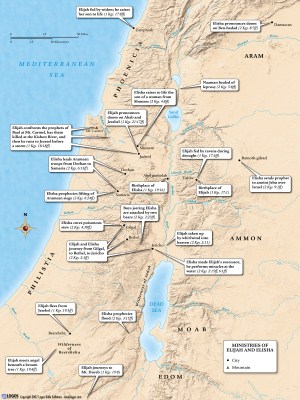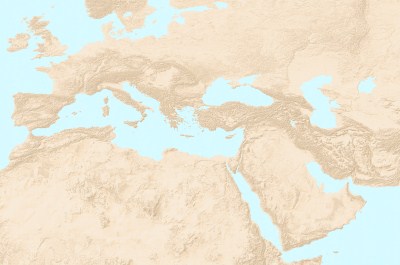20:1–12 The conflict between Aram (Syria) and Israel began when King Asa of Judah allied with King Ben-hadad of Aram in order to fight King Baasha of Israel (15:18–20). The Syrian forces emerged victorious, and Israel became subservient. In this passage, Ben-hadad reignites the conflict. |
20:1 Ben-Hadad See 15:18–20, where King Asa of Judah asks Ben-hadad for military aid against Israel.
Aram This kingdom was located north of Israel, with its capital at Damascus. The Hebrew text here calls the nation “Aram,” but it later became known as Syria (not to be confused with Assyria, the imperial power).
but it later became known as Syria (not to be confused with Assyria, the imperial power).
thirty-two kings Although ot and ancient Near Eastern sources attest to such alliances (see Gen 14), no other sources confirm such a large number of allied kings. Ben-hadad’s leadership over them (1 Kgs 20:12, 24) suggests they were likely tribal chieftains rather than kings.
Samaria The capital of Israel since the time of Omri (16:24 and note).
20:4 As your word, my master the king Ahab’s immediate acceptance of these demands and his use of deferential titles indicate that he was willing to compromise his family and wealth in the face of this military threat.
20:7 the elders of the land Refers to heads of prominent families throughout Israel responsible for managing day-to-day operations and executing justice (21:8, 11; 2 Kgs 10:1).
this man The Hebrew word used here, zeh, simply means “this”; “man” is supplied in translation. Referring to Ben-hadad as “this” instead of “he” or “him” both dehumanizes him and conveys the narrator’s disgust (compare 1 Kgs 22:27).
20:9 All that you demanded from your servant at the first Refers to silver, gold, wives, and children (v. 3).
this thing I am not able to do Refers to allowing Ben-hadad’s servants to take whatever is valuable to Ahab (v. 6), which could mean the destruction or usurpation of the royal city.
20:10 Thus may the gods do to me A common oath in the book of Kings (see 2:23; 19:2; 2 Kgs 8:12).
in the book of Kings (see 2:23; 19:2; 2 Kgs 8:12).
20:11 Let not him who girds on his armor boast A proverbial saying reminding Ben-hadad that victory cannot be assured until the battle is over. Such sayings often occur in political negotiations (2 Kgs 14:9).
20:12 tents The Hebrew word used here, sukkoth, could refer to tents, or it could indicate that Ben-hadad was in Succoth, a town in the central Jordan Valley (1 Kgs 7:46). David used Succoth as a staging area for his wars in the Transjordan.
a town in the central Jordan Valley (1 Kgs 7:46). David used Succoth as a staging area for his wars in the Transjordan.
20:13–25 Despite the disparity between Aram’s massive army and the small force of Israel, Ahab defeats Ben-hadad with the help of an unnamed prophet. |
20:14 the provinces Possibly similar to those Solomon had defined (4:1–28).
20:15 seven thousand While likely a symbolic number (see 19:18), 7,000 is a small force in comparison to the forces Ben-hadad mustered (vv. 1, 29–30; compare v. 27).
20:16 in the tents See note on v. 12.
20:22 strengthen yourself The Hebrew word used here, chazaq conveys the sense of “do your best” (Num 13:20), “gain power” (2 Sam 3:6), or “have courage” (1 Sam 4:9; 2 Sam 10:12).
at the turn of the year Refers to the time of year when kings typically engaged in warfare (see 2 Sam 11:1 and note), because the weather was good and provisions were plentiful.
20:23 Let us fight with them in the plain; surely we will be stronger than they Foot soldiers were no match for Ben-hadad’s chariots and horses on flat ground (1 Kgs 20:1), whereas the Israelites had an advantage on hills and rough terrain.
20:24 put a governor in their place All of the forces were to be brought under Ben-hadad’s authority.
20:26–34 After determining that Ahab’s first victory was a fluke (vv. 23–25), Ben-hadad fights Israel using a different tactic. However, Israel wins again, and the Arameans (Syrians) who survive the battle flee to the city of Aphek. Ben-hadad hides in an inner chamber, where he is found and taken captive. Instead of killing his enemy, Ahab goes against God’s will and makes a covenant with Ben-hadad (vv. 32–34, 42). |
20:26 at the turning of the year See note on v. 22.
to Aphek Several places are called Aphek in the ot. This one is likely located across the Jordan River from Israel, three miles east of the Sea of Galilee.
in the ot. This one is likely located across the Jordan River from Israel, three miles east of the Sea of Galilee.
20:27 as two flocks of goats Again, the size disparity between the armies is highlighted.
20:28 the man of God This title identifies a prophet or messenger of God. Here, it might refer to the same prophet mentioned in vv. 13, 22.
a god of the valleys Refers to v. 23.
20:31 kings of mercy The Hebrew word used here, chesed, also denotes “loyalty,” “honor,” and “steadfast love”; see note on 3:6.
 Chesed Word Study
Chesed Word Study
ropes on our heads Refers to a practice connected to leading war captives away, as depicted in many ancient Near Eastern reliefs.
20:32 my brother A diplomatic phrase used between parties of equal status (e.g., Judg 9:3). At the beginning of the account, Ahab was subservient to Ben-hadad (1 Kgs 20:4); now, Ahab is in control.
20:33 took this as a good omen The Hebrew word used here, nachash, implies the practice of divination.
pulled him up A mutual, public recognition of one another’s status. Jehu, king of Israel, shows this same respect to Jehonadab (see 2 Kgs 10:15).
shows this same respect to Jehonadab (see 2 Kgs 10:15).
20:34 your father Refers to Omri (1 Kgs 16:21–28). However, the text does not mention Omri losing cities to an enemy.
streets These “street markets” or “bazaars” resemble the Assyrian practice of establishing international commercial activity in conquered regions.
On these terms I will let you go The Hebrew text leaves unclear whether these words are spoken by Ben-hadad or Ahab. However, since Ahab is the victor, it makes sense that he has final say in the terms of their agreement.
 Covenants in the Old Testament Table
Covenants in the Old Testament Table
20:35 the sons of the prophets The first mention of prophetic groups in the 1–2 Kings (compare 2 Kgs 2:3).
20:36 lion found him and killed him Yahweh punished the man of God from Judah in this same way for not obeying His word (1 Kings 13:24).
20:39 a talent of silver An extremely large sum (see note on 10:15).
20:40 Your own judgment has been determined The Hebrew word used here, charats, (implying “to cut” or “to sharpen”; Lev 22:22), here means “to decide” a case (compare Isa 10:23; 28:22; Dan 9:26). The prophet designed this parable to trap the king into making a judgment against himself, just as Nathan did with David over the matter of Uriah (2 Sam 12:1–12).
20:41 the king of Israel recognized him Since Ahab had several interactions with prophets (1 Kgs 17:1; 18:17–19, 41–46; 20:13–28), he may have known this particular prophet from a previous encounter.
20:43 sullen and angry The Hebrew expression used here is also is used to describe Ahab’s anger at Naboth for refusing to sell his vineyard (see 21:1–4). Jezebel later uses a variation of the expression to describe Ahab’s spirit (21:5).

|
About Faithlife Study BibleFaithlife Study Bible (FSB) is your guide to the ancient world of the Old and New Testaments, with study notes and articles that draw from a wide range of academic research. FSB helps you learn how to think about interpretation methods and issues so that you can gain a deeper understanding of the text. |
| Copyright |
Copyright 2012 Logos Bible Software. |
| Support Info | fsb |
 Loading…
Loading…




